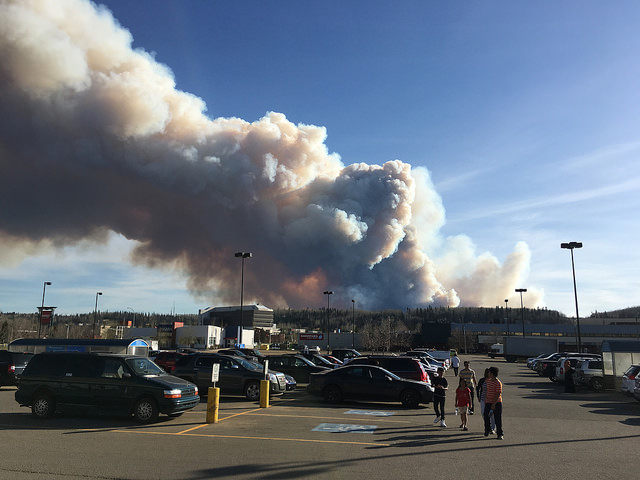Like this article? rabble is reader-supported journalism. Chip in to keep stories like these coming.
As a wildfire devastates the Fort McMurray area, Council of Canadians chairperson Maude Barlow has tweeted, “Horrible! Hearts go out to residents!”
CBC reports:
“A huge wildfire in Fort McMurray, Alta., destroyed an entire neighbourhood and burned homes and businesses in several others Tuesday, and continues to rage out of control. By late afternoon, the entire city of 60,000 had been ordered evacuated. Residents by the thousands fled the fire, and for hours caused gridlock on Highway 63, and even overwhelmed oilsands work camps [north of the city], where beds and meals were offered. Fire chief Darby Allen said the entire neighbourhood of Beacon Hill ‘appears to have been lost’ and the fire burned many homes in other parts of the city.”
APTN adds:
“First Nation communities in northern Alberta are [also] preparing themselves for evacuation if the fire engulfing Fort McMurray doesn’t subside. The Fort McMurray First Nation #468, which sits about 45 minutes southeast of the city is warning its members to keep a full tank of gas, keep the ringer on their phones on and answer any knocks on their doors.”
Fort Chipewyan resident Mike Mecredi has posted:
“The Athabasca Chipewyan First Nation has declared a state of emergency and will be working to ensure all members are safe and taken care of, if you need assistance please make sure to call and report to the office immediately.”
In addition, the Fort McKay First Nation, which is located about 50 kilometres north of Fort McMurray, has opened camps on its territory to people fleeing Fort McMurray. And Crystal Lameman has posted, “Beaver Lake Cree Nation Spruce Point Camping is available for evacuees, the resort is equipped w: 100 stalls (25 with power). BLCN has also offered the use of community hall parking lot if needed, for trailers.”
The National Observer notes:
“‘It’s apocalyptic,’ said John O’Connor, a family physician who has treated patients with health problems in the region related to oil sands pollution. He said there was no way out but north. ‘The place looks like it’s all going,’ O’Connor said. Anyone breathing the ash-filled air would be facing serious health risks, he added.”
The province’s Ministry of Agriculture and Forestry says there have already been 311 fires in Alberta this season.
Every year an area half the size of Nova Scotia burns in Alberta.
Mike Flannigan, a professor with the University of Alberta’s Western Partnership for Wildland Fire, says the average amount of land reduced to ash by wildfire in Alberta annually has doubled since the 1970s.
The wildfire is being attributed in part to the El Nino effect, which causes warmer and drier winters. Global News highlights:
“Judith Kulig, professor in the faculty of health sciences at the University of Lethbridge, said the effects of climate change are also driving the increase in wildfires, and it’s not going to get better in the future. ‘The whole aspect of climate change and global warming, which is then interrelated things such as insect infestation, so pine beetle increases because it’s not a cold enough winter,’ she said. ‘The trees are infested and drier and more prone to fire. In general, we’ve had less rainfall; we didn’t really have a winter this year. And so consequently we have a very dry environment.'”
Our thoughts are with the people and wildlife affected by this devastating situation.
Photo: jasonwoodhead23/flickr
Like this article? rabble is reader-supported journalism. Chip in to keep stories like these coming.



